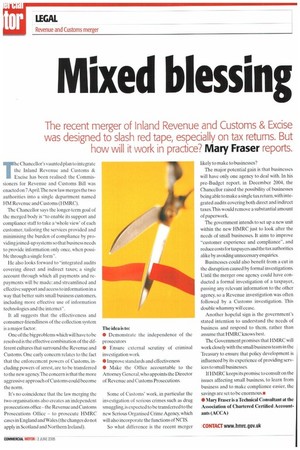Mixed blessing
Page 38

If you've noticed an error in this article please click here to report it so we can fix it.
The recent merger of Inland Revenue and Customs & Excise was designed to slash red tape, especially on tax returns. But how will it work in practice? Mary Fraser reports.
The Chancellor's vaunted plan to integrate the Inland Revenue and Customs & Excise has been realised: the Commissioners for Revenue and Customs Bill was enacted on 7April.The new law merges the two authorities into a single department named HM Revenue and Customs (HMRC).
The Chancellor says the longer-term goal of the merged body is "to enable its support and compliance staff to take a 'whole view' of each customer, tailoring the services provided and minimising the burden of compliance by providing joined-up systems so that business needs to provide information only once, when possible through a single form".
He also looks forward to "integrated audits covering direct and indirect taxes; a single account through which all payments and repayments will be made: and streamlined and effective support and access to information in a way that better suits small business customers. including more effective use of information technologies and the intemet".
It all suggests that the effectiveness and consumer-friendliness of the collection system is a major factor.
One of the big problems which will have to be resolved is the effective combination of the different cultures that surround the Revenue and Customs. One early concern relates to the fact that the enforcement powers of Customs, including powers of arrest, are to be transferred to the new agency.The concern is that the more aggressive approach of Customs could become the norm.
It's no coincidence that the law merging the two organisations also creates an independent prosecutions office—the Revenue and Customs Prosecutions Office — to prosecute HMRC cases in England and Wales (the changes do not apply in Scotland and Northern Ireland). The idea is to: • Demonstrate the independence of the prosecutors • Ensure external scrutiny of criminal investigation work • Improve standards and effectiveness • Make the Office accountable to the Attorney General, who appoints the Director of Revenue and Customs Prosecutions.
Some of Customs' work, in particular the investigation of serious crimes such as drug smuggling,is expected to be transferred to the new Serious Organised Crime Agency, which will also incorporate the functions of NCIS.
So what difference is the recent merger likely to make to businesses?
The major potential gain is that businesses will have only one agency to deal with. In his pre-Budget report. in December 2004, the Chancellor raised the possibility of businesses being able to make a single tax return, with integrated audits covering both direct and indirect taxes.This would remove a substantial amount of paperwork.
The government intends to set up a new unit within the new HMRC just to look after the needs of small businesses. It aims to improve "customer experience and compliance", and reduce costs for taxpayers and the tax authorities alike by avoiding unnecessary enquiries.
Businesses could also benefit from a cut in the disruption caused by formal investigations. Until the merger one agency could have conducted a formal investigation of a taxpayer, passing any relevant information to the other agency, so a Revenue investigation was often followed by a Customs investigation. This double whammy will cease.
Another hopeful sign is the government's stated intention to understand the needs of business and respond to them. rather than assume that HMRC knows best.
The Government promises that HMRC will work closely with the small business team in the Treasury to ensure that policy development is influenced by its experience of providing services to small businesses.
If HMRC keeps its promise to consult on the issues affecting small business, to learn from business and to make compliance easier, the savings are set to be enormous.• • Mary Fraser is a Technical Consultant at the Association of Chartered Certified Accountants (ACCA)






































































































































































































